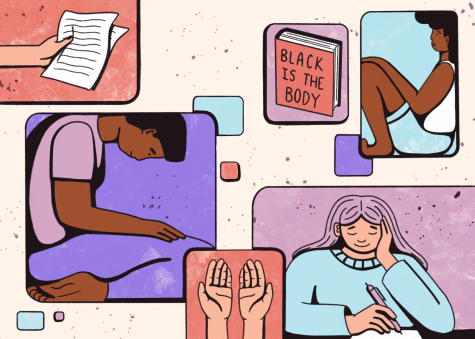Opinion: Rethinking how I write about the body in 2020 is important to my graduate thesis
November 3, 2020

During the Spring semester, I turned in an essay in my “Graduate Workshop: Nonfiction” course that I knew was going to shape my thesis. In this segmented essay, I observed people running to catch the train, a woman’s hipbones indenting the sand on a beach and dogs sleeping in Colorado windows like portraits in a museum.
I begin the essay with: “I write essays about the body and try to make them mean something.” This, I thought, encompassed what my thesis would look like—numerous observational essays on the body and my awareness of how much space my body takes up as a person with a history of eating disorders.
I began my MFA nonfiction writing program writing about the reality of living with an eating disorder. At first, I thought this meant I needed to write about the process of recovery, but that story didn’t appeal to me.
In my thesis, I wanted to figure out why every essay I wrote turned into an essay on the body and why I felt that was all I knew how to write.
But in May, when George Floyd was killed by Minneapolis police, inciting worldwide protests, I was struck by the immense amount of privilege I have as a white person writing about my body and its occupation of space, while Black people’s awareness is a safety measure.
As I began to put together my thesis, I reread old essays I wrote throughout my graduate program. In one, I have a panic attack on a crowded Pink Line train because I become increasingly aware of all the bodies surrounding me and how my body fits among them.
I wanted to delete the file from my computer.
I also read articles about people peacefully protesting the unjust killing of Black people, like Breonna Taylor, Ahmaud Arbery and Tony McDade, and others being pepper sprayed, tear gassed, beaten with batons and arrested.
I read essays by Black authors like Emily Bernard, who wrote about her white husband taking their children out.
“I know that when the girls go out with John, they’re going to come back,” Bernard wrote in “Black is the Body.” “I am talking about the killings of black men and women that now seem routine, the parade of deaths that feed the news at a steady march. I mean that the girls are going to come back alive, and that this is because of the color of John’s skin.”
I was never oblivious to the realities of systemic racism or my privilege as a white person in the U.S., but as I entered the final year of my graduate program and began meeting with my thesis adviser, I became increasingly aware of how difficult it would be to write in the same way I had been for years.
As I read my essay about my panic attack on the train again, the writing felt simple-minded. While my mental illness is valid, writing about an event like that, at this time, is inappropriate and a wasted opportunity.
My adviser sent me questions such as, “Is there something you specifically do not yet know about your thesis?” and I realized the immense amount of room my work had to expand.
I am finding balance between how I write about my body and also how trivial it feels as a white person when Black people are forced to be aware of their body in public spaces because they may be profiled, harassed or killed.
This means my thesis will now incorporate more introspective commentary, explicitly addressing how writing about my body feels superficial. This includes writing essays on my own writing process and what is going through my mind as I reread and edit old essays to better encompass my current mindset.
In the beginning, my thesis felt like a shaky bridge I didn’t know how to cross, but now it feels more like an ocean I am exploring and teaching myself to tread.







